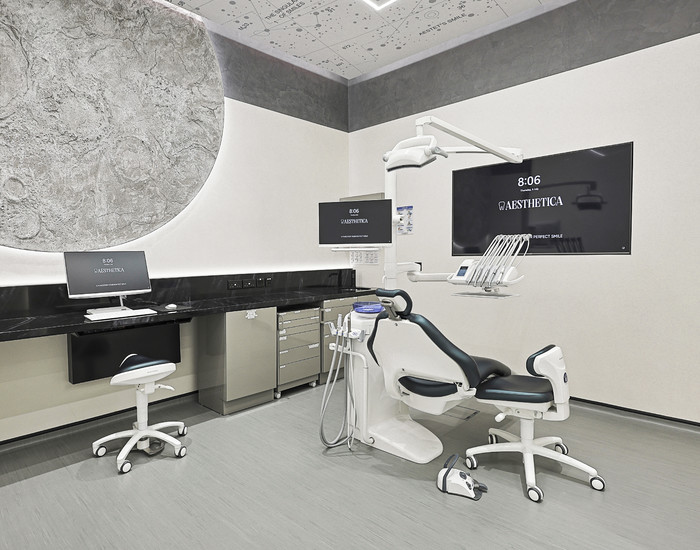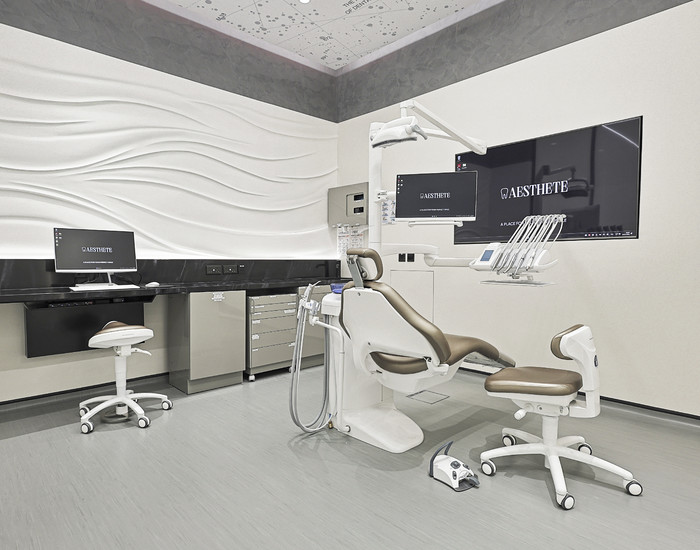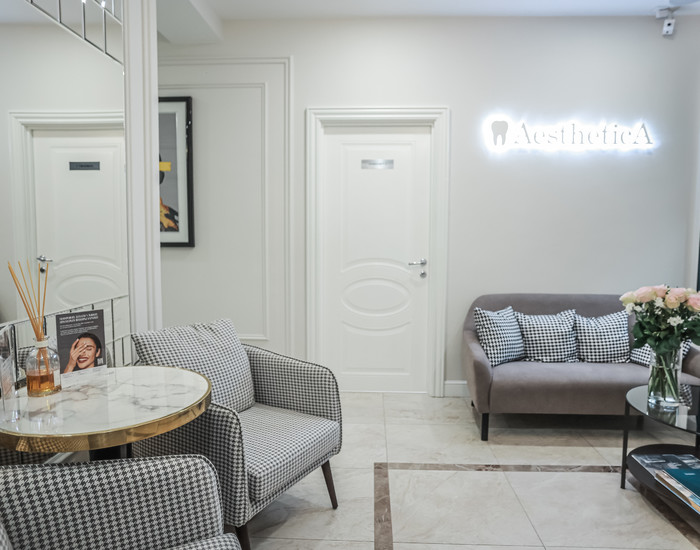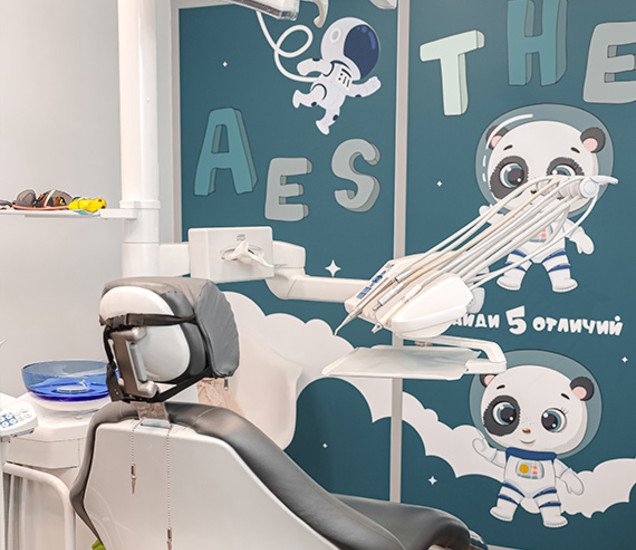The initial appointment with a dentist is very important. It is necessary to identify problems at an early stage, develop an individual treatment plan, and obtain comprehensive information about procedures and their costs. We invite you to schedule a consultation at the AESTHETE dental clinic in Dubai.
The importance of the initial consultation for effective treatment
During the consultation, the dentist conducts a comprehensive diagnosis — including examination, probing, and X-ray imaging. These methods help detect hidden issues that the patient may not notice. Based on the findings, the dentist determines the stage of the disease and chooses the optimal treatment approach. Careful diagnostics prevent situations where a tooth, after filling, begins to hurt again within a month.

The dentist explains all stages of the upcoming treatment, its duration, and cost, so the patient can plan their time and budget accordingly.
At the initial visit, contraindications and individual features are identified. Special attention is given to:
- Allergic reactions to anesthetics or filling materials;
- Chronic diseases;
- Pregnancy.
The dentist also assesses the condition of the mucous membranes, hygiene level, and presence of tartar. These factors influence treatment timelines and material choices. If necessary, additional preparation is prescribed — professional cleaning or gum treatment.
The first consultation establishes a trusting relationship between the doctor and the patient. A detailed discussion of the problem and possible solutions alleviates fears about treatment. The patient gains a clear understanding of upcoming procedures and their expected results.
Preparation for the consultation
Before visiting the dentist, brush your teeth as usual with a toothbrush and toothpaste, but without excessive force to avoid damaging any problematic areas. Do not use whitening products before the examination, as they can temporarily increase sensitivity.
Make a list of questions and complaints you want to discuss with the doctor. Be prepared to answer questions such as:
- When did the symptoms first appear?
- What factors worsen the discomfort?
- Which painkillers help?
If you have chronic conditions, prepare a list of medications with dosages.
Bring along previous examination results, X-rays, or medical records if available. This information will help the dentist understand your situation more quickly and make an accurate diagnosis.
If you are concerned about severe anxiety about treatment, discuss this with your doctor in advance. Anesthesia can be used not only locally but also sedation — a sleep-like state induced with safe medications.
-
Dental Consultation price
-
Consultation with a dental therapist
650 AED
-
Consultation with a prosthodontist for this service VAT 5% is added
650 AED
Duration of the consultation
A standard initial examination lasts about 60 minutes. During this time, the dentist performs visual diagnostics, assesses the condition of teeth and gums, and reviews complaints. If necessary, a targeted X-ray of the problematic tooth is taken, adding another 10-15 minutes. A comprehensive consultation with panoramic imaging and treatment planning can take up to an hour.
The appointment time increases with complex issues. Early-stage caries diagnosis requires more attention — the dentist uses special dyes and magnification techniques. Evaluation of old fillings and crowns also takes extra time. If the patient seeks urgent pain relief, the dentist may start treatment immediately, extending the visit to 60-90 minutes.
Preventive check-ups with a hygienist are usually shorter — about 20-30 minutes. The specialist assesses the quality of home hygiene, identifies plaque accumulation areas, and provides recommendations. Orthodontic or surgical consultations take longer due to the need for analyzing X-rays and discussing treatment options.

Factors affecting consultation duration:
- Number and complexity of problems;
- Need for additional diagnostics;
- Need to discuss financial aspects.
It is important to understand that a thorough examination cannot be too rushed — the dentist must carefully study the oral cavity.
Hidden oral health problems: what you might not notice
Many dental diseases develop asymptomatically in early stages. Caries between teeth often remains unnoticed until it reaches the pulp. Without X-ray imaging, it’s impossible to detect early decay on contact surfaces. The same applies to microcracks in enamel, which gradually expand under chewing load.
Gingivitis begins with painless gum inflammation, which many ignore. Bleeding during brushing is perceived as temporary, while the infection gradually destroys the periodontal ligament.
Gum recession progresses slowly, exposing roots and increasing sensitivity. These changes become noticeable only when the root area is significantly exposed.

Other hidden issues include:
- Impacted wisdom teeth pressing on neighboring molars;
- Cysts at the root tips — they often cause no discomfort for a long time but gradually destroy bone tissue;
- Bruxism — nighttime teeth grinding — often unnoticed until wedge-shaped defects or excessive wear appear.
Another hidden threat is occlusal disorders. Improper bite alignment causes gradual shifting of the bite, overload of individual teeth, and problems with the temporomandibular joint.
Inflammatory processes under old fillings or crowns are particularly dangerous. Microcracks between the restoration and the tooth become entry points for bacteria. Caries develops silently until it reaches the pulp.
Regular preventive examinations using modern diagnostic methods help detect these problems early.
Tips for maintaining oral hygiene
The main rule is to brush your teeth twice a day. Use a medium-hard toothbrush and fluoride toothpaste, replacing the brush every 3 months. Hold the toothbrush at a 45-degree angle to the gum line, performing sweeping motions from the gum to the edge of the tooth. Don’t forget to clean your tongue with a special surface or scraper.
Use dental floss daily to clean between teeth. An alternative is an irrigator, which removes food debris with a water jet. After snacking, rinse your mouth with water or an alcohol-free antiseptic mouthwash.
Visit your dentist for professional cleaning every six months. The specialist will remove tartar from hard-to-reach areas and perform enamel remineralization. If you are prone to cavities, the dentist may recommend special gels to strengthen your teeth. These simple habits will help maintain oral health for many years.
Our dental clinic, AESTHETE, is located in Dubai (UAE), Bluewaters Island. We invite you to schedule an appointment! During the consultation, the dentist will examine your teeth, answer your questions, and suggest solutions for your dental issues.
Sources
- Stefanac, S. J. Developing the Treatment Plan. Diagnosis and Treatment Planning in Dentistry , 4th ed., Elsevier, 2024, chap 5
- Teughels, W.; Feres, M. F.; Ganesan, S. M.; Gidley, M. D.; Hernandez-Kapila, Y. L.; Jakubovics, N. Biofilm and Periodontal Microbiology. Newman and Carranza's Clinical Periodontology and Implantology , 14th ed., Elsevier, 2023, chap 10




















_700x550_ac7.jpg)






